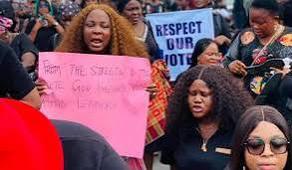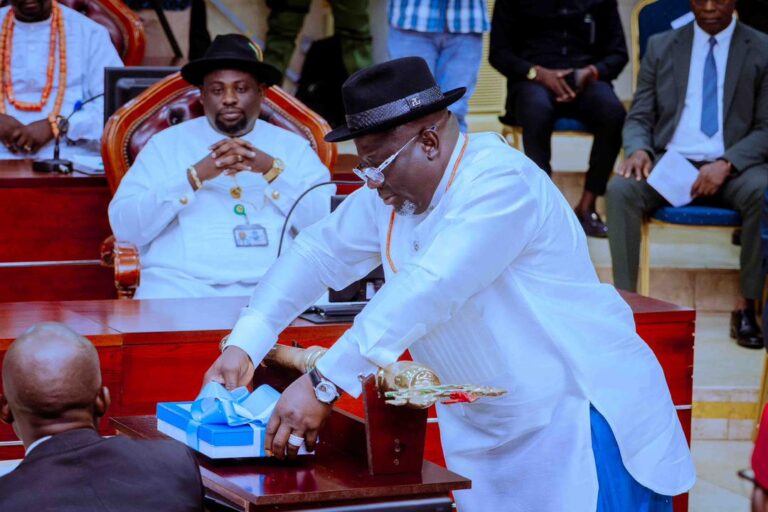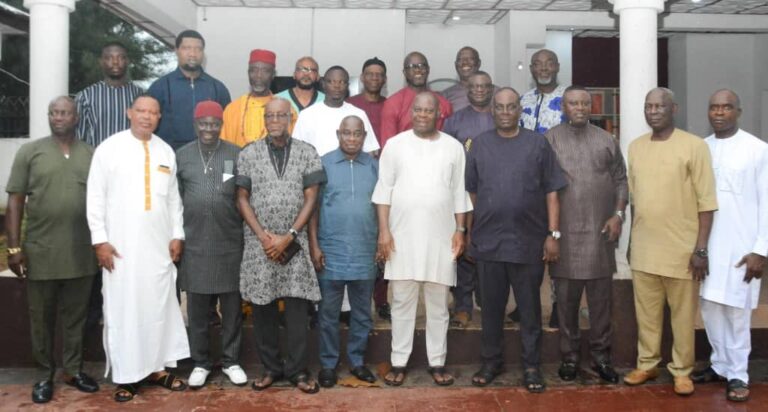
In the heart of Rivers State’s vibrant capital, Port Harcourt, a powerful display of civic engagement unfolded on a recent Friday morning as a determined assembly of women took to the streets to voice their profound discontent with the prevailing political climate.
Their collective action served as a resounding call for the immediate reinstatement of the suspended Governor Siminalayi Fubara and a definitive termination of the emergency rule that had been imposed upon their state.
The genesis of this compelling demonstration can be traced back to the early hours of the day, as these resolute women, united by a shared concern for the sanctity of their state’s democratic foundations, congregated to make their voices heard. Their presence was marked by the rhythmic chanting of poignant slogans that echoed their unwavering demands, and their hands held aloft placards bearing powerful inscriptions that encapsulated the Among the compelling messages emblazoned on these placards were fervent appeals for the restoration of their democratic rights, a clear and unequivocal demand to “#BringBackFubara,” an insistent call to uphold the fundamental principles of the rule of law, and a passionate plea to safeguard the very essence of their democratic system. These visual and auditory expressions of dissent painted a vivid picture of the women’s deep-seated anxieties regarding the current political trajectory of their state.?, captured the raw emotion and unwavering conviction of the protesters. One woman, her voice resonating with the collective sentiment of the group, was heard emphatically stating, “We want Governor Fubara back,” a declaration that encapsulated the central demand of their peaceful demonstration.
Further reports gathered shed light on the culmination of this determined march. The women’s demonstration ultimately led them to the very seat of power in Rivers State, the Government House in Port Harcourt. Here, they amplified their calls for an immediate return to the principles of democratic governance, articulating their profound belief that the existing political situation within the state was fundamentally “unconstitutional” and therefore unacceptable.
The impetus behind this significant act of public protest lies in the recent suspension of key figures within the Rivers State government, including Governor Siminalayi Fubara himself, his Deputy, Ngozi Odu, and the elected members of the Rivers State House of Assembly. This sweeping action had triggered widespread concern and ignited the flames of public dissent among the state’s citizenry.
Adding another layer of complexity to the unfolding political narrative was the declaration of a state of emergency in the oil-rich state of Rivers by President Bola Tinubu on March 18th. This decision, as cited by the President, was a direct response to a protracted period of political instability and crisis that had gripped the state, raising questions about the future of its governance.
Following the presidential declaration of a state of emergency, a significant administrative decision was made with the appointment of Ibok-Ete Ibas, a retired naval chief, to the position of sole administrator of Rivers State. This move further intensified the anxieties of those who believed that the democratic structures of the state were being undermined.
The unwavering spirit and collective resolve of the protesting women were further underscored by videos shared across various social media platforms.
These visual records captured the women engaged in the powerful act of chanting solidarity songs, their voices united in a harmonious expression of their shared grievances. Their vocalizations resonated with a clear and unambiguous demand for an immediate end to what they vehemently perceived as a blatant “breach of democratic principles,” highlighting their unwavering commitment to the restoration of constitutional order in Rivers State.



